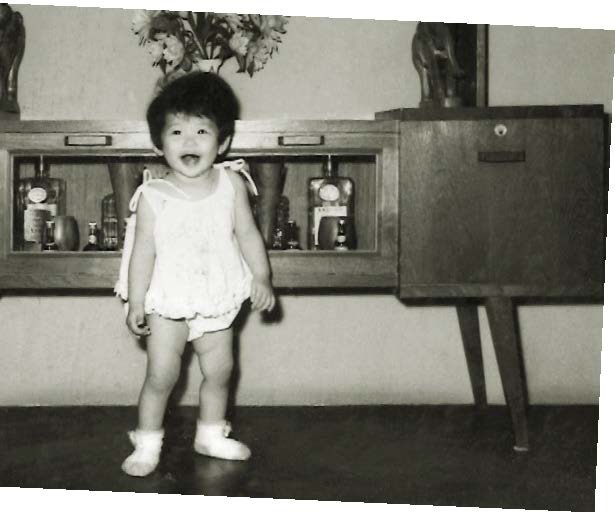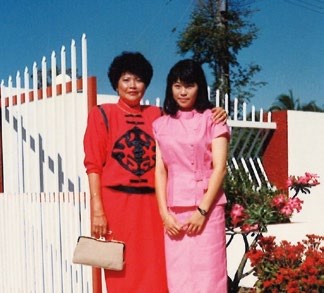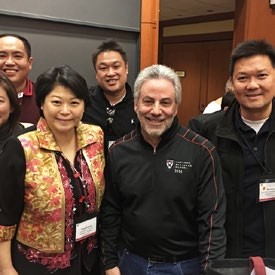She went green before businesses embraced eco-consciousness, and grew a two-person start-up into Singapore’s leading sustainable-packaging firm. Susan Chong’s story is one of single-minded vision armed with an ironclad resilience.


She went green before businesses embraced eco-consciousness, and grew a two-person start-up into Singapore’s leading sustainable-packaging firm. Susan Chong’s story is one of single-minded vision armed with an ironclad resilience.
SUSAN CHONG, LEADER OF THE PACK
She wears her humility like a badge, as she has embraced it throughout her life: as a daughter, wife, mother and entrepreneur. Her tone is composed and comforting – a foil to the rapid-fire questions posed to her.
She interrupts instinctively with an offer of a takeaway lunch while on the way back to her office at Tukang Innovation Drive in Tuas from Gardens by the Bay, where the Her World video crew has been filming her. (She has been on the Gardens by the Bay board of directors since December 2016.) Then she dives back into the conversation.
There are moments when she reveals aspects of her journey in life, and one gets the feeling of being in the presence of an inspirational life coach instead of someone who has spent nearly two decades building a multimillion-dollar empire.
Meet Susan Chong, Her World Woman of the Year 2019, and the founder and chief executive of Greenpac. Her award-winning Singapore firm has revolutionised transportation packaging for industrial products by using cost-saving and eco-friendly solutions.
Susan has been at the heart of the company’s exponential rise. The 2014 Ernst & Young Entrepreneur of the Year is a well- regarded industry stalwart who, in 2017, was also a finalist in the Circular Economy Leadership (CEL) awards scheme by the World Economic Forum. The CEL recognises innovators who are pushing forward in their respective fields and paving the way for others.
Susan’s insights are deeply rooted in years of walking the eco talk, long before it became a global topic in the now-crowded eco-hip marketplace. She speaks passionately and consciously, with a holistic view and solid understanding of the impact of how a product is made and disposed of.
Born in 1969 into a generation that emerged way before today’s heavily discussed green movement, Susan led Greenpac’s prodigious growth through innovative work for which the firm has amassed more than 50 enterprise awards.
Greenpac now counts some of the largest Fortune 500 companies in aviation, defence, biotechnology, pharmaceuticals and semiconductors among its clients.
Under Susan’s charge, the packaging start-up grew from a two-person team into a multimillion-dollar corporation with more than 50 employees at its sprawling 200,000 sq ft Green Mark Gold-certified building, Greenhub.
And Greenpac is poised for greater things as it sets its sights on global expansion.

1. Susan at 10 months old, at her family home in Alor Setar, Kedah.
HER REMARKABLE JOURNEY
Hers is a classic tale of a small-town girl from Kedah, Malaysia who moved to Penang to seek better fortunes, navigating a series of extraordinary circumstances with resilience – experiences that have made her what she is today.
A model student – she was a school prefect and captain of the swimming club – she had everything going for her as a child. That all changed when her father’s construction business went bust when she was 10.
So, at 18, instead of going to university, Susan abandoned her dream of becoming a lawyer, packed her bags, and took a train from Kedah to Kuala Lumpur to enrol in a six-month hotel and catering management course.
“It was the quickest and cheapest course for me to study, get a diploma, and find a job quickly so I could help support my family,” recalls the now 49-year-old, who recently became a Singapore citizen. “We had trouble keeping up with the rent and moved often. I hid under the table every time the landlord came to chase for payment. Each time I went home to visit my family, it was to a different house.”
She adds: “I was heartbroken when we had to sell my piano to raise the funds for my hotel course. The piano was the most precious thing in the house.”
From Kuala Lumpur, Susan headed for Penang to apply for a job as a receptionist at Ming Court Hotel during the month before she was to start her diploma course.

2. A 14-year-old Susan (back row, fourth from left) with the volleyball team of SMK Tunku Sofiah school in Alor Setar.
When she learnt that the hotel was hiring only sales executives, she managed to convince the interviewers that she could do the job, even though she was below the minimum age of 21. The gung-ho teenager took up the job in Penang and put off her diploma course.
She recalls: “I borrowed my friend’s motorcycle to do sales calls. When it rained, I was drenched, but I’d just go back, change, and head out again.”
By the time she was 19, Susan had saved enough to buy her mother a low-cost RM25,000 house in Alor Setar in Kedah, thus putting a permanent roof over her family’s heads. Six months later, the only daughter and middle child (she has two older brothers and a younger brother), was headhunted by a five-star hotel. Subsequently, pharmaceutical multinational company Pfizer came knocking at her door.
YOU NEED TO HAVE A BIG VISION AND CONVICTION. YOU ALSO NEED THAT ENTREPRENEURIAL, ‘NEVER SAY DIE’ SPIRIT, AND THE ABILITY TO EVOLVE.
– SUSAN, ON SUCCESS
“At the Pfizer interview, they asked me if I knew how many chambers there are in the heart,” she says.
“I replied, ‘No, but if you ask me how many rooms there are in my competitors’ hotels, I can tell you… all the hotels in Penang, I can tell you precisely’.”
Susan snagged the job, and within the second year, became Pfizer’s top salesperson in Malaysia and Singapore. “Pfizer gave me the opportunity that changed my life,” she says gratefully. “They sent me for training so I could communicate with doctors in their language. I was determined to learn, and wasn’t afraid to start from ground zero.”
That’s the kind of persistence and positivity that Susan is made of, and it helped her steer Greenpac to become a packaging company with an annual year-on-year growth of 20 percent.
Asked if she sees the proverbial glass as half-full or half-empty, she replies: “It’s refillable.”
Susan met her Singaporean husband while working for Pfizer in Malaysia before moving to Singapore. The couple got married in 1993, and Susan helped out in her husband’s business, a woodworks packaging company.

3. At 15 years old, with her mother during Chinese New Year in Alor Setar.
CHASING THE VISION
That was when Susan started exploring alternative packaging with the aim of adding value to an industry in which innovation was unheard of.
With a microloan of $30,000 from Spring Singapore, she founded Greenpac in 2002, at a time when going green was still a raw concept yet to be embraced by many firms.
“When I was travelling, I observed that people were only starting to talk about ‘sustainability’ and ‘energy efficiency’. I knew how much waste packaging generates, and saw a business opportunity there,” adds Susan, whose husband now runs his business with their eldest sons. The couple have four grown-up children.
One of Susan’s main objectives for Greenpac is to turn the industrial packaging industry green by using environmentally friendly materials, and reducing the amount of material that is used.
Her vision, though, was met with scepticism.
“The manufacturing sector was scaling down with companies like Seagate leaving Singapore, and the pie was getting smaller.
“No one could understand why I wanted to enter what they saw as a sunset industry. Packaging was seen as the least important thing on customers’ minds: It only exists to get products to their destination, and is then discarded. The thinking was, just any box would do.”
Undaunted, Susan familiarised herself with industrial packaging, and even learnt to operate a forklift.
Then, as hard disk and electronics manufacturers left Singapore, she shifted her sights to a new group of customers – the oil and gas, semiconductor, medical and defence industries, many of which, she observed, were more resistant to economic downturns.
The hands-on boss knocked on doors, cold-called potential customers relentlessly, and was undercut by competitors
She says matter-of-factly: “Often, when there was a rejection, I kept it to myself. What purpose would telling anyone serve? I just had to solve the problem and focus on all the positives, and work harder.”
Susan was then confronted by yet another obstacle: She needed customers to entrust their packaging problems and products to her before she could even begin to design a solution for them.
“We were a start-up with no background, and no one would just entrust medical equipment worth $250,000 to a stranger,” Susan says. “In our first four to five years, we spent a lot of time sharing the importance of being lean and green.”

4. With her classmates and Professor David Yoffie at Harvard Business School in 2015, while attending the school’s Owner/President Management programme.
TURNING POINT
Susan quickly offered what businesses really wanted: bottom-line cost savings.
This time, she and her engineering team minimised the materials used to reduce freight cost, selecting materials that would cut down the packing and handling time. Her solutions also addressed customers’ specific problems, such as parts that constantly went missing, or engineering the packaging for medical crates to fit into a passenger plane for shipment without damaging the product.
“We re-engineered our wooden pallets for packing. Local mixed hardwood weighs about 25kg a pallet. We used imported pinewood, making each pallet 10kg lighter. So businesses would get huge savings in freight costs as they shipped hundreds and thousands of pallets around the world every month.”
Susan’s redesigned solutions saw up to 30 percent savings in packaging cost. She took her new proposition and began chipping away at the market. Greenpac had marked its turning point, and business started to grow.
Indeed, among Susan’s chief characteristics are her capacity for problem-solving and an ironclad resilience, revealing a disruptor spirit that underlines her vision for Greenpac. When faced with obstacles, she falls back on a simple adage: Try again.
In 2008, six years after Greenpac was founded, the firm was ranked fourth in the prestigious Enterprise 50 Awards – organised by KPMG in Singapore and The Business Times – which Susan remembers as “one of my proudest moments”.
But what’s truly admirable is this: Susan built Greenpac when she was juggling the business with motherhood.

5. Greenpac’s 2018 joint community outreach with the People’s Association Nanyang Constituency Office saw them sharing vegetables harvested from Juying Primary School’s hydroponic system (sponsored by Greenpac) with families in need.
A BALANCING ACT
“My youngest child was four when I started Greenpac, and I had to travel a lot,” she recalls. “It’s not easy for mothers to drop everything and take off the next day. You have to stock up the fridge, make sure someone takes the kids to school and tuition – there are all these logistics.”
She credits her husband and late mother-in-law for helping her raise the children.
Her husband puts it simply: “If you don’t support your wife, you probably don’t understand how capable she is. If you do, you’d know it’s only fair to give her every opportunity to pursue what she wants.”
Susan ensured that her work trips were short, flying long-haul for just a day or two, then coming right home.
She admits: “I find it hard to strike a balance. When you’re at work, you constantly think of family, then when you’re at home, you feel that you’re neglecting your work. The key is to stay focused on your role at that point in time.”
When she was 40, Susan made up for the missed opportunity in her youth – not going to university – by getting an Executive MBA from the National University of Singapore. She later enrolled in Harvard Business School’s Owner/President Management programme. She describes this period as her “best learning years”.
She adds: “I want women to know that even though they may have dreams that seem impossible to achieve now, they should never forget what they are. Keep them close to your heart.
“It’s about your aptitude for learning, how determined you are, and your attitude. If you have a good attitude and really keep working on your goals, someday you’ll see success.”
I WANT WOMEN TO KNOW THAT EVEN THOUGH THEY MAY HAVE DREAMS THAT SEEM IMPOSSIBLE, THEY SHOULD NEVER FORGET WHAT THEY ARE.
– SUSAN, ON KEEPING SIGHT OF GOALS
At home, Susan is like any mum, cooking the family’s favourite meals, such as Penang laksa, on weekends.
“Some perceive a woman with a family to be a handicap, but I think with all this multitasking, you’re even more productive and organised. I think it’s good training.”
The young Susan had this “training” when she had to cook, look after the household and care for her brothers when her father’s business failed.
“Up until then, my mum was a tai tai – we had a driver and domestic helpers,” she remembers.
But Susan’s mum rose to the occasion by starting her own business, working with a publisher, and selling books to kindergartens all over Kedah.
Susan credits her mother, now 80, for her own ability to recover from setbacks.

6. Susan with her husband and four children on vacation in Kanazawa, Japan, in 2016.
THE PEOPLE’S LEADER
It’s noon, and an hour into the interview. We hear the sound of chatter as we approach the rooftop of Greenpac’s four-storey complex. The door opens onto what looks like a picnic in progress – employees chatting over lunch at tables set amid greenery. A closer look shows vegetables like brinjal and sweet potato growing in the garden. They’re used as ingredients for staff meals cooked (sometimes by Susan) in the open kitchen.
“We grow vegetables, which we donate to the neighbourhood. We’ve also donated hydroponic systems to neighbourhood schools so children can grow vegetables for their projects,” Susan says.
We see a group of staff communicating animatedly in sign language, and we learn that the warehouse staff are fluent in it.
This has everything to do with Greenpac’s inclusive hiring policy that counts ex-offenders, and individuals with physical disabilities – like Carmen Foong, who has a hearing and speech disability – among its employees. Carmen works in the warehouse as a senior operations assistant.
Susan, who is fluent in sign language, points out: “I was always given the opportunity to learn, and Greenpac hires the same way. Carmen couldn’t get a job until she came to us. She has been with us for 10 years now, and is one of our most hard-working employees. It creates a special company culture based on mutual respect when we hire inclusively.”
Greenpac is built upon the founding values of empathy and community-mindedness, making corporate social responsibility a priority. The firm picked up the President’s Volunteerism and Philanthropy Award in 2017, which Susan describes as “real encouragement for the team”.
The firm’s community involvement is a reflection of Susan’s social leadership. Programmes include student internships, school learning journeys, community outreach programmes, and sponsorships – such as the packaging of the telecommunications equipment for the first local all-woman expedition to Mount Everest in 2009. (The six mountaineers received Her World’s Young Woman Achiever award in 2009.)
“I received a lot of kindness from other people, and have always felt it’s important to give back,” Susan says.
“After all, if you make so much money, what are you going to do with it? It’s the legacy you leave, not the amount of money, that really matters.”
Her social contribution extends to her personal volunteer work, which began from the time Susan started visiting orphanages with her own children when they were young. Her daughter says: “My mum would always say there are many ways to contribute. You don’t need to be a big company, or rich, or have a title to be able to do things.”
Susan has come a long way – from that small-town girl to an industry forerunner – on her own terms. She says: “To succeed, you need to have a big vision and conviction. Those are the determining factors for success. You also need that entrepreneurial, ‘never say die’ spirit, and the ability to evolve and do things differently.”
In a corner of her office, a grand piano takes pride of place.
“It’s a reminder of where and how I started,” Susan says. “It’s one of those things that makes you who you are, no matter how far you’ve come. You always have to remember your roots.”
PHOTOGRAPHY VERONICA TAY
ART DIRECTION ALEX GOH
STYLING EVON CHNG
HAIR JIMMY YAP
MAKEUP BENEDICT CHOO
OUTFIT DOROTHY PERKINS























